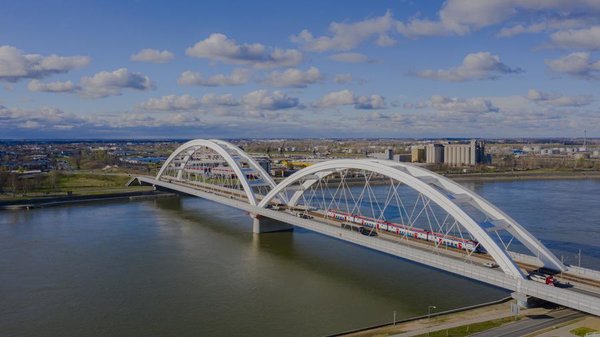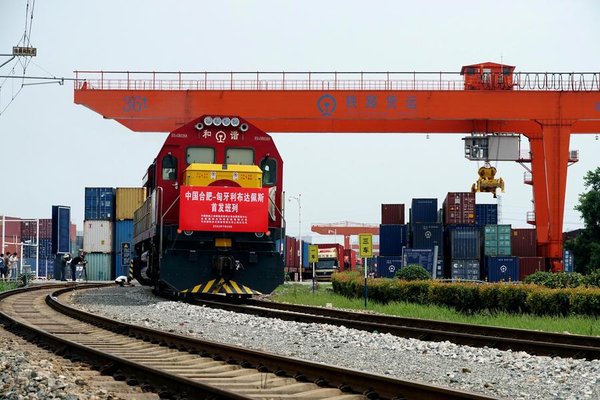Xinhua Headlines: Xi's Upcoming Europe Visit to Enhance Bilateral Ties, Cooperation
 |
| A train runs on the Belgrade-Novi Sad high-speed railway on the Danube river in Serbia, March 12, 2024. [Photo by Ren Weiyun/Xinhua] |
Chinese President Xi Jinping's upcoming visits are expected to promote the sustained, steady and sound development of China-Europe relations, help provide more stability and certainty for a turbulent world, and further energize global development.
BEIJING, April 30 (Xinhua) — Chinese President Xi Jinping will pay state visits to France, Serbia and Hungary from May 5 to 10.
The visits will be the Chinese president's first trip to Europe in the past nearly five years. Xi's trip is expected to enhance bilateral relations with the three countries and boost their mutually beneficial cooperation.
Meanwhile, China and the European Union (EU) are two major forces advancing multipolarity, two major markets in support of globalization, and two major civilizations championing diversity.
Xi's upcoming visits are expected to promote the sustained, steady and sound development of China-Europe relations, help provide more stability and certainty for a turbulent world, and further energize global development.
Unique History, Steady Partnership
Xi's upcoming visit to France marks his third state visit to the European country after visits in 2014 and 2019. This visit will take place during the 60th anniversary year of China-France diplomatic ties, which gives the visit special meaning as an important opportunity to build on past achievements and guide the future for bilateral ties.
Under the guidance of the two heads of state, China and France have witnessed the steady development of their bilateral comprehensive strategic partnership. The two countries have also become staunch advocates for the multi-polarization of the world and the democratization of international relations.
As today's world is once again at a critical crossroads, China and France should jointly open up a path of peace, security, prosperity and progress for human development, Xi said in January while exchanging congratulations with his French counterpart, Emmanuel Macron, on the 60th anniversary of diplomatic ties between the two countries.
There are many "firsts" in China-France relations: France is the first major Western nation to formalize diplomatic relations with the People's Republic of China in 1964, and the first major Western country to form a comprehensive strategic partnership with Beijing. The European country is also the first among Western nations to conduct civilian nuclear energy cooperation with China.
 |
| Visitors walk past the France pavilion during the second China International Import Expo (CIIE) in Shanghai, east China, Nov. 5, 2019. [Xinhua/Zhang Yuwei] |
The unique history of bilateral ties has shaped the "China-France spirit," featuring independence, mutual understanding, foresight, mutual benefit and win-win cooperation. Over the past six decades, this dynamic relationship has witnessed numerous historic milestones and tangible accomplishments.
Trade is one example. Bilateral trade between China and France has surged dramatically, increasing 800-fold to reach 78.9 billion U.S. dollars in 2023. China is now France's largest trading partner in Asia, while France ranks as China's third-largest trading partner and the third-largest source of investment in real terms within the European Union (EU).
China and France are representatives of Eastern and Western civilizations respectively. In recent years, the two sides have continuously expanded their cultural and people-to-people exchanges.
For example, the two sides have cooperated in the restoration and protection of their respective iconic cultural heritages, including the Notre Dame Cathedral in Paris and China's Terracotta Warriors. The two sides have also set up cultural centers in each other's countries and designated 2024 as the China-France Year of Culture and Tourism.
Though France and China are very different regarding culture, history and political systems, "we can draw inspiration from our differences to progress together," said Eric Alauzet, president of the France-China friendship group of the French National Assembly.
The key is "to talk to each other, to listen to each other, and to understand each other," he said.
Ironclad Friendship
"Ironclad" is often used to describe the relationship between China and Serbia.
Xi called Serbia "an ironclad friend" of China during his meeting with Serbian President Aleksandar Vucic, who was in Beijing to attend the third Belt and Road Forum for International Cooperation in October last year.
He said that bilateral relations have withstood changes in the international landscape over recent years and are an example of friendly relations between China and European countries. In response, Vucic said his country is proud of its ironclad friendship with China.
The fruitful Belt and Road cooperation between China and Serbia is a testament to the special relationship.
 |
| Steel coils are seen at the steelworks of HBIS Serbia in Smederevo, Serbia, May 5, 2023. [Xinhua/Ren Pengfei] |
The high-speed train linking the Serbian capital Belgrade and the country's second-largest city Novi Sad is a part of the Belgrade-Budapest railway. It is a key project of cooperation between China and Central and Eastern European countries under the Belt and Road Initiative.
In March, the Belgrade-Novi Sad high-speed railway marked its second anniversary. Over the past two years, the railway has transported some 6.83 million passengers, effectively enhancing local connectivity.
The rebirth of Smederevo Steelworks is another good example of a strong partnership. The plant, located near the Danube River and considered the pride of Serbia, was once on the verge of bankruptcy. However, with the burgeoning Belt and Road cooperation between China and Serbia, the century-old factory experienced a remarkable resurgence.
After a Chinese company invested in the mill in 2016, things changed: Thousands of jobs were saved, and the production capacity and environmental performance greatly improved.
Meanwhile, Serbia and China are close trading partners. The European country has participated in the China International Import Expo for six consecutive years. Beer, red wines, agricultural products, and other products from Serbia have become favorites with Chinese consumers.
In October 2023, China and Serbia signed a free trade agreement to boost bilateral trade and business ties, the first one inked by China with a country from Central and Eastern Europe.
The brotherly friendship between China and Serbia is also attributed to the fact that they always help each other in hours of urgent need.
In 2008, after a major earthquake occurred in China's Sichuan Province, Serbia mobilized a batch of tents from its military reserves to aid China's disaster areas. During the COVID-19 pandemic, the Chinese government dispatched a medical expert team to Serbia to assist in combating the outbreak.
 |
| Serbian President Aleksandar Vucic (L) greets members of the Chinese medical team via elbow contact in Belgrade, Serbia, March 21, 2020. [Xinhua/Shi Zhongyu] |
Xi's visit to Serbia will be his second visit to the country in eight years, which will mark an important milestone for strengthening and elevating China-Serbia ties.
New Chapter in China-Hungary Cooperation
Xi's upcoming visit to Hungary marks his first state visit to the European country as China's head of state.
Over the past 75 years since establishing diplomatic relations, China and Hungary have enjoyed mutual respect, mutual understanding, mutual support and mutual trust.
Hungary is the first European country to sign a Belt and Road cooperation document with China. In 2017, the two countries announced the establishment of a comprehensive strategic partnership.
 |
| A China-Europe freight train bound for Budapest, Hungary leaves a logistics base in Hefei, east China's Anhui Province, July 29, 2022. [Photo by Xi Jingyu/Xinhua] |
China is willing to continue to be good friends and partners with Hungary who trust each other and pursue win-win cooperation, and take the China-Hungary comprehensive strategic partnership to new levels, Xi said during his meeting with Hungarian Prime Minister Viktor Orban in Beijing in October 2023.
With the care and strategic guidance of the leaders of both countries, China-Hungary connectivity continues to deepen, with pragmatic cooperation flourishing.
Both sides are promoting a deep synergy of the Belt and Road Initiative with Hungary's "Opening to the East" policy. From direct cargo flights between Budapest and Chinese cities including Zhengzhou and Ningbo, to the efficient operation of China-Europe freight trains, the enhanced transportation network has significantly boosted Hungary's position as a transportation hub in the region.
Moreover, both China and Hungary have a long history and splendid cultures, and the peoples of the two countries have enjoyed a time-tested friendship and increasingly close cultural exchanges.
Last year, in his reply to a letter from students of the Hungarian-Chinese bilingual school in Hungary, Xi encouraged Hungarian youths to learn more about China and become envoys of the China-Hungary friendship.
 |
| A Chinese teacher instructs students on Chinese calligraphy at Hungarian-Chinese bilingual school in Budapest, Hungary, Feb. 24, 2023. [Xinhua/Lian Yi] |
Founded in September 2004, the Hungarian-Chinese bilingual school is the first full-time school in Central and Eastern Europe that uses both Chinese and the local language for instruction, a model of cultural and educational cooperation between the two countries.
Sustained, Sound China-Europe Relations
China always views its relations with Europe from a strategic and long-term perspective and views Europe as a comprehensive strategic partner and an important force in a multi-polar world.
The two sides should do more to increase the breadth and depth of cooperation and tighten the bond of shared interests, Xi said in December 2023 during his meeting with President of the European Council Charles Michel and President of the European Commission Ursula von der Leyen in Beijing.
With concerted efforts from both sides, China and the EU have emerged as each other's second-largest trading partners, underscoring the fact that for China and the EU, cooperation far outweighs competition, and the areas of consensus far exceed differences.
 |
| Photo taken on May 27, 2021 shows the Kaposvar solar power plant in Kaposvar, Hungary. Hungary inaugurated the country's largest solar power plant, which was built by China National Machinery Import and Export Corporation (CMC) near the southwestern city of Kaposvar. [Photo by Attila Volgyi/Xinhua] |
In 2023, the China-Europe freight train service had connected 219 cities in 25 European countries, establishing a secure and efficient lifeline for global industrial and supply chains.
Meanwhile, China has granted visa-free entry to multiple European countries, facilitating personnel exchanges and economic and trade activities between the two sides.
Key cooperation projects under the Belt and Road, such as the Belgrade-Budapest railway, the Port of Piraeus in Greece, and the Peljesac Bridge in Croatia, continue to benefit people along the routes.
As the international landscape is undergoing profound changes, global observers hope that China and Europe can strengthen their communication and cooperation.
"Many agree with the Chinese president's principle that we are all in the same boat, (and) that our common destiny is linked," said Stephan Ossenkopp, a senior researcher with the German think tank the Schiller Institute.
"A respectful exchange between our civilizations at both ends of the Eurasian continent is essential," said Ossenkopp.
Meanwhile, Lyazid Benhami, vice president of the Paris Association of French-Chinese Friendship, said "China and Europe are two major global players, and global challenges require them to work together."
"Dialogue and joint action based on mutual respect are the only tools capable of bringing about a better shared future," said Benhami.
(Source: Xinhua)
Please understand that womenofchina.cn,a non-profit, information-communication website, cannot reach every writer before using articles and images. For copyright issues, please contact us by emailing: website@womenofchina.cn. The articles published and opinions expressed on this website represent the opinions of writers and are not necessarily shared by womenofchina.cn.








.jpg)

 WeChat
WeChat Weibo
Weibo 京公网安备 11010102004314号
京公网安备 11010102004314号